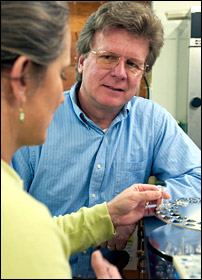
|
 |
Research > Ocean
Institutes > Ocean and Climate Change Institute
Ocean and Climate Change Institute
 |
 |
| Institute
Director William Curry with Research Assistant Marti Jeglinski,
who loads a sample vial into a stable isotope mass spectrometer.
The mass spectrometer analyzes chemical compositions of
fossil marine organisms to reveal the temperature and
carbon content of ocean waters that existed in the past
when the organisms were alive. (Photo by Tom Kleindinst) |
Pursuing greater understanding of the oceanís role in climate change, the Ocean and Climate Change Institute (OCCI) launched support for several new research projects, an OCCI fellow, and two postdoctoral scholars, and also sponsored a conference on a key abrupt climate change in the past.
In 2003, the OCCI initiated a rapid response to the loss of a moored profiler at Station W, which was deployed near the Bahamas in 2002 to collect crucial measurements of the Gulf Stream and Deep Western Boundary Current. The Institute funded deployment of a replacement mooring to prevent a gap in measurements
until new moorings funded by the National Science Foundation can be deployed in 2004.
New research projects launched by the Institute include an autonomous
glider program; development and application of new geochemical
paleothermometers; a comparison of deep convection models; initiation
of an integrated biogeochemical flux and hydrographic program
at Station W; a study of deep-water variability during the Holocene;
and an analysis of sedimentary records of millennial-scale hydrological
variability in the northeastern United States over the past
15,000 years.
The OCCI also funded projects to establish or supplement Arctic Ocean and Atlantic Ocean observing
systems to enhance understanding of the regionís potential impacts on climate change: the Beaufort Gyre Freshwater Observing System, the Davis StraitĖLabrador Sea Observing System, and the East Greenland Current Observing System.
The Institute supported four fellows in the third year of their terms and one new fellow, Scott Doney, who pursues research in marine biogeochemistry and ecosystem dynamics, large-scale ocean circulation and tracers, air-sea gas exchange, and the global carbon cycle. New postdoctoral scholarships were awarded to Mahdi Ben Jelloul, who studies low-frequency variability in the oceans, and Dierdre Toole, whose research focuses on climate responses and potential feedbacks from the biogeochemical cycling of sulfur in the upper water column. The Institute also continued
to support MIT/WHOI graduate student Rose Came, who studies the recent geological history of intermediate water circulation.
With additional OCCI funding, OCCI Fellow Lloyd Keigwin hosted a successful international conference
analyzing the mechanisms that triggered an abrupt climate change 8,200 years ago, a past analogue
to potential future climate change.
—William Curry (wcurry@whoi.edu)
Ocean and Climate Change Institute Director
|
|
